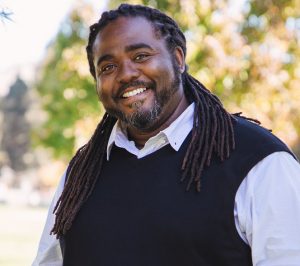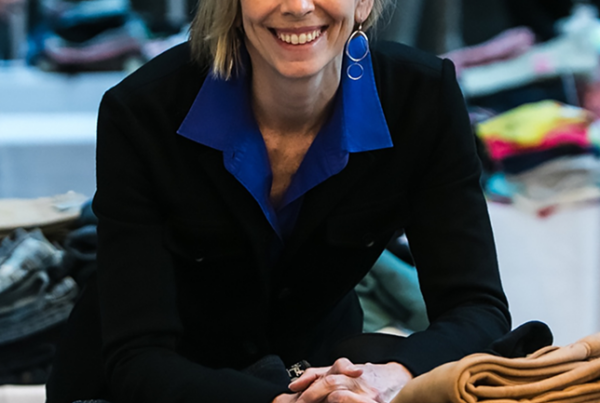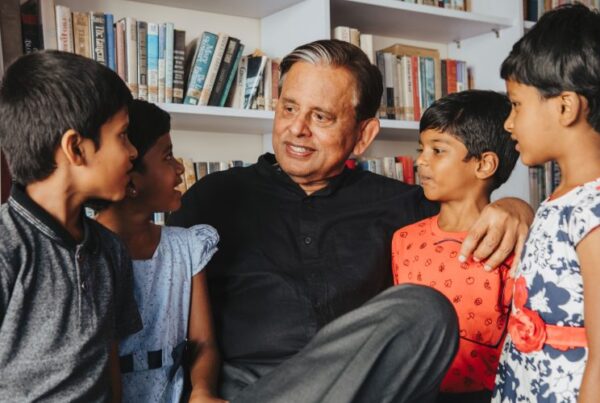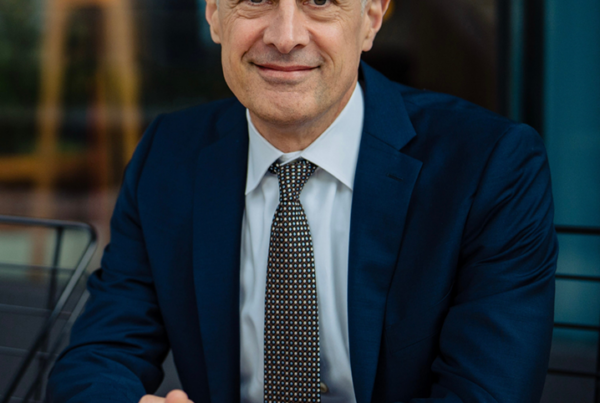Podcast: Play in new window | Download
Subscribe: RSS
Where do young men go to share their deepest fears and find connection and purpose?

Ashanti Branch
Ashanti Branch works to change how students, especially young men of color, interact with their education and how their schools interact with them.
Raised in Oakland, by a single mother on welfare, Ashanti left the inner city to study civil engineering. A construction project manager in his first career, his life changed after he tutored struggling students and realized his passion for teaching.
In 2004, during Ashanti’s first year teaching high school math, he started the Ever Forward Club to provide support for African American and Latino males who were not achieving their potential. Since then, Ever Forward has helped all of its more than 150 members graduate from high school, and 93% of them have gone on to attend two- or four-year colleges, military or trade school.
The Ever Forward Club was featured last year in the documentary, The Mask You Live In, which premiered at the 2015 Sundance Film Festival. After completing a fellowship at the Stanford school in 2016, Ashanti stepped away from working for a school district and began working as the Founding Executive Director for Ever Forward – Siempre Adelante in an effort to grow the organization to serve thousands of Bay Area students.
In 2017, Ashanti was awarded a fellowship from the national organization CBMA – Campaign for Black Male Achievement. In 2019, Ashanti received a fellowship from the Gratitude Networks and was a top-three finalist for the LinkedIn Compassion award.
At the Ever Forward Club, they believe that all young men have the desire to be fully alive – to be loved, respected, held in high regard, held to high expectations, held accountable for their actions and supported to help achieve their goals. Their objective is to create the space for this to happen.
What We Discuss With Ashanti Branch in This Episode
- What inspired him to start the Ever Forward Club?
- Why are so many young men angry and frustrated?
- What does the mask represent and why is it necessary to remove it?
- Where do the masks we all wear come from?
- What are the biggest challenges you face as a leader?
- What is the 100K Masks Challenge?
Transcript Highlights
Tell us about Ever Forward Club and your mission.
When I started Ever Forward, it was not intentional. I was not trying to start a non-profit. I can’t imagine anybody thinks about it and says, “Let me start a business where I’ve got to be chasing money all the time in order to pay the people who are going to do the work.”
I mean, there’s no profit in what you’re doing. What you’re doing is the service, getting back to the community, and helping lives be better; which sometimes in our society doesn’t seem to have a financial reward to it. So you end up just doing it out of the kindness of your heart, but you also need to survive. And so I speak about that right now because it’s a lot right now as a leader.
Ever Forward started in 2004. I was a first year teacher. I never wanted to be a teacher, I wanted to be rich. I was raised by a single mother, we were poor and on welfare and I realized that I have a choice in this matter.
They told me there was a formula. They said, if you study hard, go to college, you get a good job, and you make a lot of money, you live happily ever after. That’s a five step formula that I’ll follow any day. If I get happiness ever after and I can make a lot of money, and all I have to do is study hard? OK.
I followed the formula, so when I went to school to be an engineer, I’m like, “I’m about to be rich”. I had a plan and during that journey of my engineering work I was making some really good money. But happily ever after was not happening.
And so Ever Forward, the journey and the movement came about, because I was in this job that I could do, but it wasn’t fulfilling. I remember one day at work seeing one of the managers in the corner, wheeling and dealing. And I’m like, “I don’t want to be doing that.”
So my mind was already thinking of what else is there. So I was a first year teacher doing a horrible job. I love math. I like teaching math. I liked students. It’s a good formula. But there were a lot of young men in my class who I identified with who weren’t passing my class. So I was like, “Look, I’ll quit. I’m not going to be the teacher that you blame in the future, who did a bad job and made your life worse. I’ll go back to making money and finding happiness somewhere else, you know?”
But something inside me said, “Try something else.” So I invited some of the young men to lunch. I said, “I’ll buy you lunch once a week. In exchange for lunch, you teach me how to be a better teacher.”
That’s how Ever Forward was started.
They began to talk. “I’m not going to be no nerd, no geek, or no teacher’s pet.”
Everything about being smart to them was negative. And I realized that these students thought that being smart wasn’t cool and they wanted to be cool. So therefore if you have a view in a community where “smart is not cool” and you want to be cool, then you’re going to do whatever it takes so people don’t ever think that you’re smart.
And that’s what Ever Forward was about. I was like, “Look, at least pretending to be smart is going to help you graduate. How about we just figure out how you’re going to graduate because your 13 year old freshmen immature self is going to sabotage your 18 year old trying to move on with life self, and it’s going to be too late.
So we just began to meet and have conversations and I realized that I was like them in middle school because I had a teacher who caught me. Miss BP – I’ll never forget her. She said to me one day in detention, “Life doesn’t give you what you want. Life gives you what you get and you’ve got to make the most out of it.”
I had a lot of sadness, but in my community boys can’t be sad. I was sad that I didn’t have a father. I was afraid that I had a situation in my home where my mom had married a guy who wasn’t really nice. I was afraid that a lot of stuff happens at home. But I can’t show these emotions. I’ve always got to be funny, happy or angry, because those are respected emotions for men in my community.
So that was 2004 and we’re now in 2020. 16 years later we’ve created this movement called the 100,000 Masks Challenge. When I started this idea with masks, I wasn’t trying to change the world. I had eight young men in a room every week that came together. They’d just lie to each other. Everybody’s doing perfect. On a scale from 1 to 10 everybody’s a 10. I’m like, “Yeah, no you’re not a 10.”
I was a Dean that year so I knew what was going on behind the scenes. I’m like, “You got kicked out of 5 classes today, how are you a 10?” But in front of each other they had to tell that story.
The mask activity became a way to take off that mask. When we created that first activity where they wrote those masks, they wrote on the front what they let people see and on the back what they don’t let people see. Then those masks got mixed up with a little snowball fight we had. I was hoping it was going to work; I was willing to try anything. I had tried so many other things and when it worked, it absolutely changed my life.
And it changed the lives of young men in the room. I think the people who see the documentary can see young men get to a place of, “Oh wow, it’s not just me. I’m not alone.”
I wasn’t trying to create a movement. I was trying to help these young men in my math class be successful; to have a journey of life and have to choice to go and follow their heart rather than following the money because I had experienced that.
How do you use the mask to create the conversations that transform their identity – how they feel about themselves, how they see each other and how they bond together?
I start with empathy. When I work with educators and we train people to do this in their classes, we give them curriculum or ways people can use it as a part of this movement. I tell them, “Your job is not to try and fix them. Your job is trying to bring it into awareness that they’re not alone.”
I think the biggest goal of this campaign has been to help people around the world recognize that we have so much more in common with people around us, than we can ever see with our eyes.
In the early days, I tried to do give advice. When I began to get away from being connected to the results, it changed my life. Ultimately all I can do is be a vessel. I’m going to give and expect nothing in return. I 100% know that if I get clear about that, my work is done with the best intention.
Whether they’re 14, 19, or 28 they’re going to do what they need to do for their life and ultimately you can just provide whatever they’re willing to let you provide for them. I think that’s the work.
I’m going to pick up a mask from yesterday. This is the random one. On the front it says loyal, put together, and candid. On the back it has the things that this person doesn’t talk about: grades, insecurities, and family. I can go through this stack of young people and you will see very similar stuff, but who am I to try and fix your family, or your insecurities?
I can just tell you that I think you’re incredible, I think you’re amazing, and that’s all I can do. And I can tell you that some of those stories you’re telling yourself are just that – just stories that you’re telling yourself. You don’t have to believe the stories you’re telling yourself and can tell yourself a different story.
People only get a part of you. They’re defining you based on only the parts that you’re willing to let them see. Therefore if you want them to see you for real, you may have to let them see more or find the people who can handle that. So that’s how I work with young people.
With this campaign – the 100,000 mass challenge – we’ve reached 14 countries. We’ve collected 43,000 masks. The momentum is really big right now. So our goal is to hit our goal by May.
Where does this mask come from? Why do we have these masks in the first place?
I’m reading this book by Mark Brackett called “Permission To Feel”. When was the last time I asked you how you feel and really meant it? We don’t really ask people that, but also, do we even know what we feel? There’s phrase that talks about if you can name it then you can tame it.
But if you can’t even name how you feel, how do you deal with it? There could be many ways how I will look if I’m happy or sad or solemn, right? If I’m just looking normal day, I’m not even thinking about how I’m voting and I’m just standing there. You may think I was upset because that’s just how my lips are curved. I’m not mad, I’m doing fine. But based on what you see, you think, “that person is not doing so good.” But we don’t ask.
So I think the big picture is, do we get a chance and do people really care enough to even let us tell them how we’re doing? I think the mask is created from young. I’m always preparing and watching how parents, fathers, mothers are interacting with little boys. I didn’t have a father growing up so I’m always watching fathers and thinking about what it would have been like for me to have a father.
I noticed that they start early. We tell boys when they’re little to stop crying like a little girl. We say things to conform them to how we want them to behave. And then we were confused when they become adults and we ask them how they’re feeling and they don’t have anything to say.
Because the things that they were feeling at one point you recognized, and you didn’t want to hear, see, and therefore we had to shut them off. Oh, this emotion can’t be accepted in this house, in this family, with this person, with these friends. So I got to shut them down, and then we get confused.
Our jails are full of men. Jails are 94% men. Something’s wrong there. I don’t think something’s wrong with men. I think we taught them things when they were boys and when they became adults, they can’t live among the free.
Violence is what happens when we don’t know how to deal with our suffering. I knew that when I was in middle school and getting in trouble a lot, I was dealing with a lot of sadness and fear in my life. But I didn’t have a place to talk about that. So I’d just stuff it and make everything funny, happy, or angry. And angry is always usually easier and comes quickly, and therefore people get it.
So the mask comes from programming – words, emotions, and feelings that we get from people as we grow up. It says, “Here are the things that are acceptable. Here are the things that are not acceptable.”
I love my mom. I’m thankful for her. But I could tell when my mom came home from work, if it was going to be a bad day or good day. Uh oh, she’s slinging her bags out of the car. Let’s put on this mask, trying to make everything okay, and make her calm so she doesn’t come in a tirade about the dust or anything. I had a programming in my head that that’s not going to be good for us. I was the oldest and was running the house. So I was the man of the house. My job was to protect all of my siblings from a mom who may just have had a bad day.
That’s where the mask comes from. I think they become really powerful. I had one young man in a circle session say, sometimes if you are wearing this mask, you can forget who you really are.
There’s a book that I’m reading called, “I Don’t Want To Talk About It” which talks about men – the really unseen level of men and depression. They talk about this idea that girls are taught not to show their assertive self. The boys are taught the opposite. That you must, you’ve got to show your assertive self, or something’s wrong with you. You’re supposed to be assertive.
And then we’re confused as to why people in society that are acting in certain ways. We can talk about the school shootings, and that’s a very deep, intense level. But imagine how many businesses there are where the CEO goes in shooting people down with words every day; where there’s no psychological safety, where there’s this idea that I’m not violent, but I’m speaking in tones that feel like violence. I’m speaking in words that feel not affirming and supportive and caring and loving and kind.
What happens is that we often use the examples that are the most dramatic, which are absolutely crucial to talk about. And we sometimes overlook the unkind stuff because we say, “Well, that’s just his character. That’s just the personality.”
I think this world just needs more kindness. We tell young men, let’s just start with kindness. I think it’s easy to do. You may not be used it, or used to me being kind to you. You may think they want something from you because they’re being nice to you. But what about just being able to try it? And that’s the work, right?
Many things we operate under are unconscious – we make them conscious and then we can begin saying, “Okay, I’ve been doing that. I’ve been operating like this automatically.”
As a leader, my mind is thinking about 18 things and I don’t want to be disconnected from people. I like people, so how do you make sure that you take that unconscious and make it conscious? “Hey, I know I walked in just totally off. I’m just going through a lot.”
So people don’t think that it’s them, right? Kids will do the same. The parents don’t talk about what they’re really going through. The kids will make it about themselves. It’s about something they’re not doing right.
As a leader, what has been your greatest challenge and how have you dealt with it?
I will say my biggest challenge is coming to an awareness. I didn’t sign up for this. I didn’t sign up to run an organization. I started mentoring young men in my classroom and one lady said, “Hey, I want to give you some money but you need your non-profit status so I can give it to you.”
I’m like, “So you are going to give me money if I go and do this thing? Okay.” And then I realize that there’s a book you’ve got to write. And then wait, so now what do I do? And then how do I keep the non-profit status? I’ve got to turn in some receipts and how do I keep track of all that while I’m teaching?
I’m just mentoring young people after school, on weekends or holidays and then I realize, “Oh, I could go into a deep well of what’s happening now.”
So I got clear early on last year in 2019 that to whom much is given, much is required. I’ve been given a big dream and so even though I didn’t sign up to figure out how to run a board or create the board of directors, I have to be responsible for what it takes to really build that dream. And that means also not me having to do it all. I’m really working on learning how to ask for help. I think one of my biggest challenges is asking for help.
Even when people come to me at the end of a talk and they say, “Let me know how I can help.” It makes me feel so good. But I never do it because I don’t want to bother people. How do you offer me some help when I know you’re already busy?
One of my mentors said, “Why are you taking away the opportunity for them to give, like you get to give, by being selfish?
Deep down I never thought that they would want to get some of the good feelings that I get from doing this work. I never thought of it that way and I think it’s just only me growing as a leader.
I didn’t learn about entrepreneurship growing up or about building a business. I learned how to work really hard, and one of my challenges as a leader is also that I want to do it. I want to be doing this stuff. I’m really working on learning how to delegate.
There’s so much behind the scenes today. I want to speak some serious truth. Today is Thursday. My grandmother passed last Thursday. I’m on my way to Stanford for a presentation. So how do you deal with still needing to go to work while you’re trying to deal with grief?
I don’t need to spill my problems on my team. I want to be human but I can’t stop the company because I’m going through stuff. So how do you keep showing up?
Because I work at an organization that’s about helping people around social and emotional wellbeing, I keep living the work that I’m teaching. I can’t hide it. I could. I could just pretend like everything’s fine. I can just pretend that it’s no big deal, or that nothing’s happening. And deep down it’s a dance between how much do I tell them and how much I keep to myself and try to still be present? When I’m dealing with family drama, right?
So I didn’t plan to deal with it. I’ve got a lot of other things on my plate. We’ve got a gala coming up next month, and I’ve got a presentation… Layers and layers. How do I continue to keep showing up and being kind to others, even when I’m going through some tough times?
So I think the work as a leader – the challenges – are practicing what I preach. Find the right people who can help you take the mask off. You can’t do it with everybody but find the right people so you know that you can go and be able to just cry and feel and not pretend like everything’s okay.
Those are the things that are constant daily reminders in this work. Heart is hard work and it’s not just hard with paying the people, it’s hard because you’re taking from people in this way and you got to make sure you have a way of dealing with it yourself because you’re helping them process some of their stuff. Where do you go and process yours?
In my early days of this work, I never thought about myself. So I would just take all this stuff from people. Then I ended up hitting a wall and I didn’t know what was happening.
Then I started learning from some mentors that you’ve got to have a place of letting go of some of that stuff yourself because you’re taking on all this stuff with these young people who get to come and share it with you. Do you take it on, carry it and wear it or do you let it come in and fly out?
You can only hold onto so much. That’s the work. There are so many layers of challenges. There are the challenges of the business and there are the challenges of just being an authentic human. Even when you’re supposed to be the boss and you’re supposed to have all the answers. Sometimes I don’t have all the answers. Sometimes I don’t even know what to do next. I got an email from somebody the other day that was complicated to deal with. What do I do with this? I just need to breathe on it for a couple of days. I don’t know what to do. Where do I start?
So all the layers are just a part of my own growth and development as I’m trying to be a person who is helping people around the world in their own stuff that they deal with. That’s been the beauty of it and sometimes the challenge of it.
Episode Resources
- Ashanti Branch TEDx Talk: The Masks We All Wear
- Featured in Documentary: The Mask You Live In
Connect With Ashanti Branch and the Ever Forward Club
- Website: https://everforwardclub.org
- Facebook: https://www.facebook.com/everforwardclub
- Instagram: https://www.instagram.com/everforwardclub
- Twitter: https://twitter.com/everforwardclub
Listen on Apple Podcasts, Spotify, Pandora or Stitcher.
Did You Enjoy The Podcast?
If you like this episode let us know! Reviews for the podcast on iTunes are greatly appreciated. This helps us reach more entrepreneurs seeking to make a positive impact in the world. If you received value from this episode, it would mean so much if you could take a moment and leave your 5-star rating and review. You can do that by visiting here. Thank you! Together we can make a difference!
Additional Episodes You May Like
- 279: Steve Mariotti: Activating The Entrepreneurial Mindset In Under-Resourced Youth
- 264: Lucas Mack: Unleashing The Vulnerable Hero
- 191: Steve Trullinger: Windows To The Father’s Heart
- 170: Brandon Walden: The Power Of Our Words To The Next Generation
- 161: Bill Ferguson: Part 2 – Healing The Deeper Hurts That Mess Up Our Lives
- 019: JuVan Langford: Cultivating Meaningful Mentor Relationships With Our Youth










